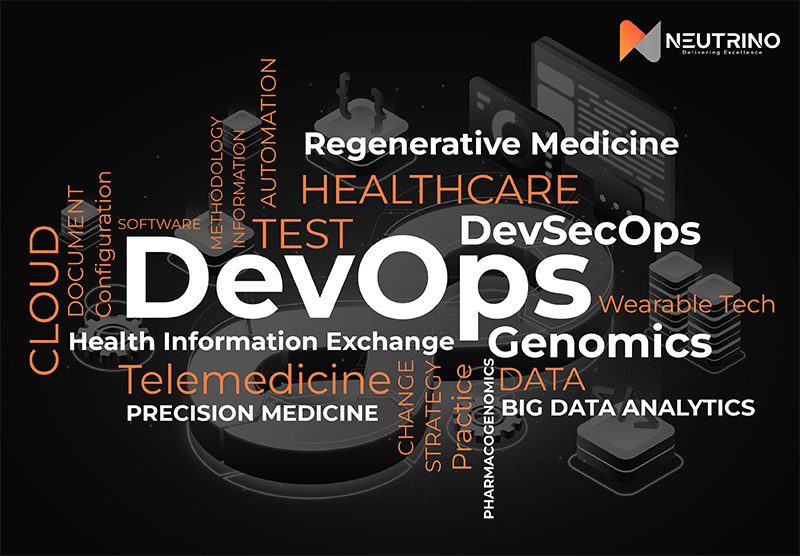How DevOps in Healthcare can anchor today’s medical sector for tomorrow?

- June 30, 2023
The past few years have been a roller coaster ride for many businesses. For what? Due to Coronavirus pandemic. It hugely engulfed the healthcare sector and made it crumbly. Due to shortage of resources, more patient’s footfall increased, healthcare providers lost their lives with shortage of medicines for others. The IT sector has spun the wheel around. With the aid of DevOps in healthcare, the scenario has been embraced without getting succumbed.
The increased pressure of work has led to the application of DevOps & DevSecOps in the healthcare sector. Research claims that 41% of healthcare experts report that using DevOps in healthcare has saved time for developers to speed up delivery.
To understand this a little better, here are listed challenges that established the need for a DevOps framework in the system.
DevOps: The Flagbearer in Healthcare
DevOps has come a long way. Starting from
- Combining automation and handling agile processes
- Optimizing performance and improving collaborations between multiple departments.
Its cross-functional development methodology ensures quick delivery of high-quality software, continuous integration, and development.
Advantages of DevOps in Healthcare:
1. Improving engagement:
Healthcare companies that include CI/CD pipelines tend to deliver the best features and solutions. For instance, self-check-in systems (this allows faster processing of patients) and electronic prescription filling. It allows patients to get medicines even when they are not in the hospital promises. Radically enhance patient care and satisfaction.
They directly address patients’ needs for easy and quality healthcare services. Attendees can also set up automatic appointments. It improves operational efficiency without compromising the quality of service.
2. Manage data:
When it comes to data, hospitals are always overflowing with patient information, numbers, reports, and whatnot. To ease this pressure, DevOps in healthcare comes as a rescue. In the form of a responsive and cost-effective solution, it aids. It improves productivity that creates a competitive edge. This interlock helps to manage that data through data pipelines and big data applications.
3. Automating development:
DevOps processes can help healthcare providers with applications. It incorporates automation into their existing systems. This approach helps them meet service level agreements (SLAs) and efficiently manage resources.
4. Data security and regulatory complaint:
DevOps in healthcare allows operators to combine security fundamentals inside the application itself. This methodology is called DevSecOps. It stands for the development, security, and operations. Simultaneously, it automates the integration of security at every phase of the software development lifecycle. This includes from initial design through integration, testing, deployment, and software delivery.
How to Implement DevOps for better healthcare?

1. Continuous planning:
One needs to examine the development and operational activities to modify them towards the implementation of DevOps. During this initial stage, the financial implications of development and required human resources must be planned.
2. Code repository with version control:
One needs to ensure a version control system, which is an essential requirement for developers to coordinate and control coding. Every custom healthcare solution can be tracked. DevOps in healthcare application development provides developers with an offline copy of the code repository, along with every change recorded on the main server.
3. Continuous integration:
Before building and testing, focus on continually cropping up changes in the code to the central repository. Deploy CI (continuous integration) tool that assists healthcare application development with better accuracy and integrated results. On the other hand, CI assists with the automation of software updates and cross-departmental integration of data.
4. Automated build:
Introduce automation toward integrated care solutions. This includes scripting and automated retrieval of the code. This recovery should be enabled from the code repository. It is then compiled into a binary artifact to allow for periodic testing.
5. Automated release through continuous deployment:
This process involves delivering the software with regular updates in an automated and continual fashion. Continuous deployment ensures any-time release of the custom healthcare solution through regular updates to the production.
6. Constant feedback and monitoring:
This final step includes the deployment of DevOps in the system. It includes continuous monitoring which ensures healthcare software and applications are working properly or not. You need to choose a micro-approach that is adopted to look into minute details. It also seeks feedback at regular intervals through self-monitoring analytics.
How Neutrino Can Help?
DevOps implementation in the healthcare sector is vivid. But, when implemented in a correct manner, it ensures simplification and better structuring of the process. DevOps in healthcare assist providers in extending better care to their patients by reducing downtime and optimizing access.
Our team of experts with proven complex delivery experience can help you from assessment and strategy planning.
- Consultation
- DevOps & SRE Strategy
- Implementation
- Proactive Monitoring and Maintenance
Services We Offer:
- Continuous integration/Continuous delivery
- Automated infrastructure provisioning
- Site reliability engineering (SRE)
- Release management
- Blue-Green Deployments
- Cloud-Strategy
See more information about: DevOps And Digital Transformation: Say Bye To Silos!
Wrapping Up!
DevOps can be a game-changer. Organizations that are yet to adopt DevOps in their system, stand outmoded. It is working in silos and independently of one another. This divide creates a barrier across teams. Making communication more difficult across departments. The need of the hour is to implement the DevOps framework in the right way. With the DevOps mindset, expert solution provider can help you assess the loopholes and drive toward apt strategy and solutions.
